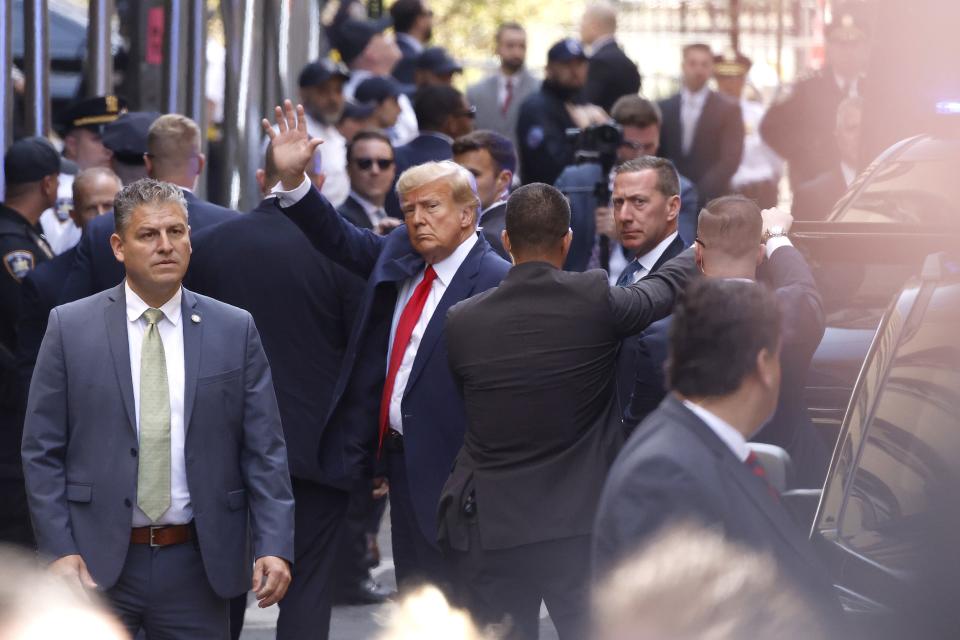DOJ opposes Donald Trump's proposal to start federal election conspiracy trial in 2026
- Oops!Something went wrong.Please try again later.
- Oops!Something went wrong.Please try again later.
WASHINGTON − Federal prosecutors opposed Donald Trump's proposal to wait until 2026 to start his trial on charges he conspired to steal the 2020 election, arguing Monday that his lawyers mischaracterized how much evidence they must review and schedules for other cases.
Justice Department special counsel Jack Smith's team urged U.S. District Judge Tanya Chutkan to start the trial Jan. 2 − on the eve of presidential primaries − as they proposed earlier.
"In service of a proposed trial date in 2026 that would deny the public its right to a speedy trial, the defendant cites inapposite statistics and cases, overstates the amount of new and non-duplicative discovery, and exaggerates the challenge of reviewing it effectively," wrote Molly Gaston, a prosecutor on Smith's team.

Trump faces four charges in the case, including conspiracy to defraud the country and conspiracy to obstruct Congress.
Smith's team proposed to leap-frog Trump's three other criminal cases, including Smith's federal case alleging Trump mishandled classified documents after leaving the White House. Jury selection would begin Dec. 11 and testimony on Jan. 2.
But Trump sought to postpone criminal trials until after the 2024 presidential election. In the election conspiracy case, Trump's lawyers argued they needed more time to review voluminous evidence in the case, including 11.5 million pages of documents and hundreds of witness interviews.
Smith's team argued 3 million pages of the documents came from Trump entities; a million pages were already publicly available from the House committee that investigated the Capitol attack on Jan. 6, 2021; and hundreds of thousands of other pages came from the National Archives where they were already available. Prosecutors said they loaded electronic records, such as 3 million pages from the Secret Service, in easily searchable form.
Government lawyers also argued that in calculating the average time for conducting a trial at nearly 30 months, Trump's lawyers included times from indictment through sentencing rather than the start of a trial. In addition, the case lengths were for cases from October 2021 through September 2022, when cases were pulling out of a backlog created by the pandemic.
"This small and skewed sample provides no help to the Court in deciding an appropriate trial date," Gaston wrote.
Chutkan has a hearing scheduled Monday for lawyers to debate issues such as the trial date in the case.
The dispute over the federal election trial comes as Trump juggles a half-dozen criminal and civil trials in the next year. But some of the dates could be postponed, particularly based on arguments about reviewing classified documents and what evidence will be allowed at trial:
New York Attorney General Letitia James has a $250 million civil trial scheduled against Trump’s company on Oct. 2, which could last six weeks.
E. Jean Carroll has a $5 million defamation case in New York scheduled for trial Jan. 15 – the day of the Iowa caucuses − and projected to last two weeks.
In Georgia, Fulton County District Attorney Fani Willis proposed to start her racketeering trial March 4. A judge hasn't set the date yet.
Manhattan District Attorney Alvin Bragg has a trial that could last five weeks set to start March 25 on charges of falsifying business records.
Smith has a tentative trial date for charges of mishandling classified documents May 20, with the trial lasting an estimated five weeks.
This article originally appeared on USA TODAY: DOJ opposes Trump proposal to start election conspiracy trial in 2026

